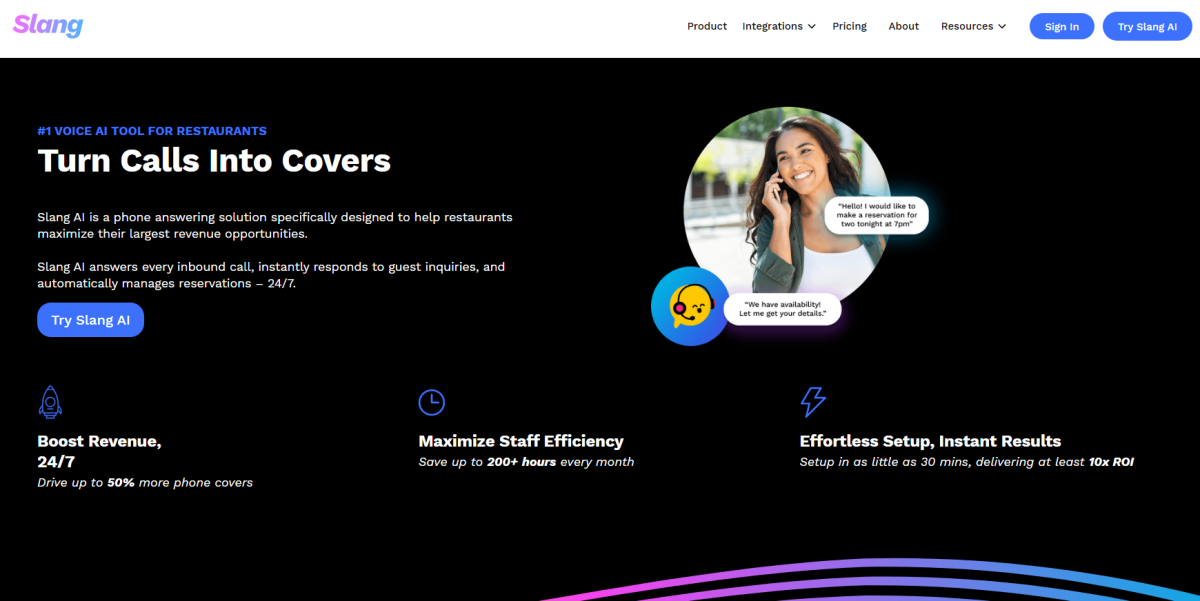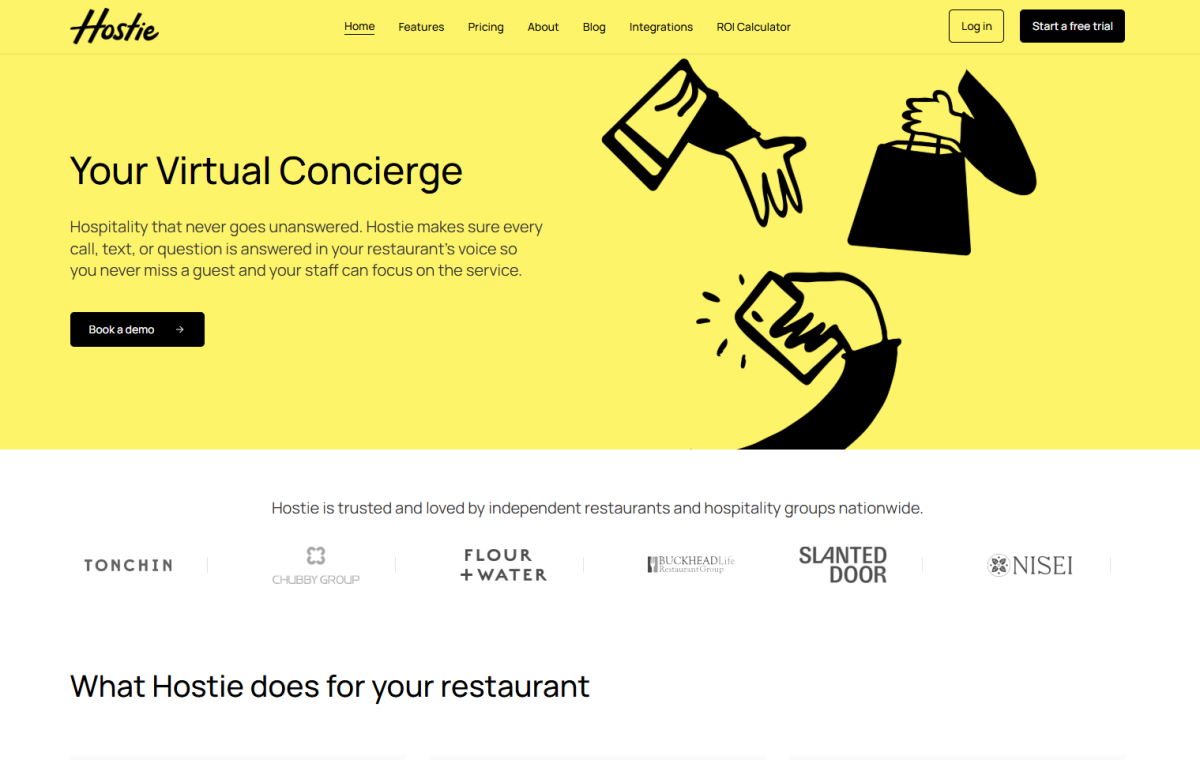Bland vs Hostie: Side-by-Side Review of Restaurant AI Voice Technologies
Resource
Compare Slang vs Hostie on features, pricing, and real results. See why restaurants of all sizes choose Hostie for effortless, human guest communication.
November 3, 2025
•
Comparison

When a guest calls your restaurant, it’s an opportunity to profit and build loyalty. Both Slang and Hostie were created to make sure those opportunities never slip through the cracks. These platforms help restaurants handle guest calls automatically so teams can focus on service, not endless ringing phones.
Where Slang approaches the problem through broad automation, Hostie was created by restaurant people who understand the value of every guest interaction.
This guide breaks down Slang vs Hostie across features, pricing, and use cases to help you find the right fit for your business. Let’s start with a quick side-by-side look at how Slang and Hostie compare.

Slang is a voice assistant platform built to help restaurants handle phone calls when staff are tied up with guests. It can answer common questions and even take reservations through connected systems.
The idea is simple: keep guests from hitting voicemail and free up your team’s time during busy shifts.
Main features include:
Slang is a helpful first step toward automating phone operations. Still, it’s not without a few challenges.
Some users find the setup process a little technical, and customization options are fairly limited. The automated voice can also sound generic if it isn’t adjusted carefully.
Slang pricing starts at $399 per month per location, with premium tiers for expanded features. Smaller venues may find costs add up as call volume grows.

Hostie is a hospitality-focused communications platform built to help restaurants manage guest calls, texts, and reservations with ease. It acts as a virtual front-of-house assistant that never misses a call – whether your restaurant is open, closed, or in the middle of a rush.
Main features include:
For restaurants, Hostie stands out because it blends automation with a human touch. Setup is simple, and responses feel personal rather than robotic.
A great example of Hostie’s impact in action is Wayfare Tavern, which saw a 150% boost in phone bookings after adopting Hostie’s virtual hostess. The platform handled repetitive tasks, while staff focused on hospitality, showing how technology can enhance service rather than replace it.

Both platforms share a similar mission, which is to make restaurant communication easier – a goal that reflects the broader benefits of voice AI for modern restaurants. But how they deliver on that mission is what sets them apart.
Slang offers a polished experience once configured, but setup can require coordination with your existing phone and booking systems.
Hostie, on the other hand, was designed for simplicity. Most restaurants are live within an hour, with guided onboarding that ensures your system sounds like your restaurant from day one.
Our intuitive dashboard helps you see call metrics and adjust tone without needing tech support. For busy operators juggling dozens of daily tasks, that ease of use makes all the difference.
Slang handles call answering and basic reservation booking. Hostie is a virtual front-of-house assistant that manages reservations, orders, and guest messages. It works and feels like a virtual concierge, offering personalized responses and a consistent tone that reflects each brand’s personality.
We also emphasize hospitality-first customization. Every restaurant can define how the system greets guests and which questions it prioritizes, whether it’s hours, specials, or event bookings.
For operators looking to blend technology with personality, Hostie delivers automation that feels human.
Slang integrates with reservation tools like OpenTable and SevenRooms. Hostie offers similar integrations and also connects with platforms such as Resy, Tock, Toast, Square, and Tripleseat. These integrations make it easy for restaurants to manage calls, reservations, and guest communication in one place.

Both Slang and Hostie were built to solve the same problem. But the way each platform fits into daily operations can look very different depending on the size, setup, and goals of the business.
Slang performs best in structured environments where there’s already a dedicated tech team managing integrations and fine-tuning call flows. Restaurants that rely heavily on systems like OpenTable or SevenRooms may also find Slang’s compatibility convenient.
For enterprise-style operations that need consistent call coverage across multiple locations, Slang can be a solid, high-volume solution.
Hostie stands out for its flexibility. It’s built for restaurants of every size, from single-location independents to multi-unit groups and enterprise brands. The platform combines intuitive setup with deep customization so that teams can get started quickly and grow without technical barriers.
Hostie is especially valuable for restaurants that:
In short, Hostie adapts to every kind of operation. Whether you're running a family-owned restaurant or a national hospitality group, it brings a human touch to every automated guest experience.
Both platforms help restaurants manage guest calls, but they take different approaches. Slang focuses on automating restaurant calls through voice technology, while Hostie combines automation with a hospitality-first experience. The result is a virtual host that sounds natural, personal, and on-brand for each restaurant.
Hostie’s pricing starts at $199 per month per location, with higher tiers at $399 and $599 offering additional features and support. Slang starts at $399 per month per location for its Core plan and $599 for Premium.
Both scale with business size, but Hostie’s lower entry price makes it easier for smaller restaurants to budget and grow.
Yes! Restaurants can start a free trial and explore how Hostie works in real time before committing.
Both platforms are transforming how restaurants handle phone calls, but they take different paths.
Slang delivers solid automation for enterprise-level operators. Hostie brings hospitality back to automation, blending technology with the warmth and responsiveness that guests expect from your team.
Ultimately, the best fit depends on your priorities: whether you need broad, enterprise-style automation or a hospitality-focused system that enhances efficiency without losing the human touch.
If the latter sounds like your restaurant, see what a virtual concierge can do for you. Start a free trial with Hostie and experience it in action today!